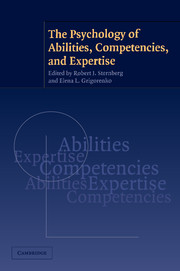Book contents
- Frontmatter
- Contents
- Preface
- List of Contributors
- The Psychology of Abilities, Competencies, and Expertise
- 1 Trait Complexes, Cognitive Investment, and Domain Knowledge
- 2 Intelligence as Adaptive Resource Development and Resource Allocation: A New Look Through the Lenses of SOC and Expertise
- 3 Developing Childhood Proclivities into Adult Competencies: The Overlooked Multiplier Effect
- 4 The Search for General Abilities and Basic Capacities: Theoretical Implications from the Modifiability and Complexity of Mechanisms Mediating Expert Performance
- 5 On Abilities and Domains
- 6 Expertise and Mental Disabilities: Bridging the Unbridgeable?
- 7 The Early Progress of Able Young Musicians
- 8 Expertise, Competence, and Creative Ability: The Perplexing Complexities
- 9 Biological Intelligence
- 10 What Causes Individual Differences in Cognitive Performance?
- Index
- References
10 - What Causes Individual Differences in Cognitive Performance?
Published online by Cambridge University Press: 05 June 2012
- Frontmatter
- Contents
- Preface
- List of Contributors
- The Psychology of Abilities, Competencies, and Expertise
- 1 Trait Complexes, Cognitive Investment, and Domain Knowledge
- 2 Intelligence as Adaptive Resource Development and Resource Allocation: A New Look Through the Lenses of SOC and Expertise
- 3 Developing Childhood Proclivities into Adult Competencies: The Overlooked Multiplier Effect
- 4 The Search for General Abilities and Basic Capacities: Theoretical Implications from the Modifiability and Complexity of Mechanisms Mediating Expert Performance
- 5 On Abilities and Domains
- 6 Expertise and Mental Disabilities: Bridging the Unbridgeable?
- 7 The Early Progress of Able Young Musicians
- 8 Expertise, Competence, and Creative Ability: The Perplexing Complexities
- 9 Biological Intelligence
- 10 What Causes Individual Differences in Cognitive Performance?
- Index
- References
Summary
INTRODUCTION
What are the determinants of individual differences in cognitive performance? Among the answers offered by the chapter authors are that cognitive performance depends on genes, ability, experiences, or knowledge. In this chapter, I provide a model of the determinants of individual differences in cognitive performance and show how it relates to some of the proposed answers provided by the contributors to this book. According to the model, ability and experience interact to produce specialized knowledge, which in turn enables cognitive performance. After describing the model, defining key terms, and examining key issues, I review eight major empirical findings cited by the chapter authors and show how these findings contribute to fleshing out the model. Overall, the book reflects psychology's multifaceted search for an understanding of individual differences in cognitive performance.
SEARCHING FOR THE DETERMINANTS OF INDIVIDUAL DIFFERENCES IN COGNITIVE PERFORMANCE
A student scores high on a standardized test of verbal ability. An expert memorizer listens to a list of fifty digits and recites them back without error. The head of a small company devises a successful plan to launch a new product. A young woman writes a moving poem about mental disabilities. These are examples of cognitive performance – that is, observable behavior on a cognitive task. What causes individual differences in cognitive performance – that is, why do people perform differently on cognitive tasks? This is the motivating question for the contributors to The Psychology of Abilities, Competencies, and Expertise.
- Type
- Chapter
- Information
- The Psychology of Abilities, Competencies, and Expertise , pp. 263 - 274Publisher: Cambridge University PressPrint publication year: 2003
References
- 21
- Cited by

